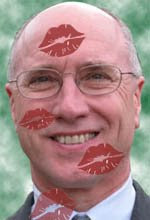DK has left a new comment on your post "Noah Needed Church Growth Consultants":
Dear Professor Jackson:
I've read a few things on Ichabod about 'cell groups'. You've state that they are a breeding ground for Enthusiasm. I've looked into it a little, via internet and by asking questions of a friend of mine, who belongs to a WELS cell group.
My friend states that cell groups are a way for a church to foster a community that knows and is accountable to each other. He points out that church members tend to see each other only on Sundays--which isn't in itself bad, but if you can build friendships with those you worship with (meeting for Bible study during the week, etc) the fellowship of believers is strengthened. Beyond that he would divulge little info about what a cell group actually does or is. His only attempt to clear up that vagueness was to invite me to attend a cell group session.
Having recently moved back to Milwaukee (an unfortunate vocational necessity) I'm coming in contact with all these new fads in the church and so I'm asking legitimate questions: If what my friend says is true, why are cell groups necessarily breeding grounds for Enthusiasm? Couldn't a Lutheran potluck be equal in that potential? Am I missing something of the root or essence of a cell group?
As for myself, I would never attend anything called a cell group, simply because I think it carries strange and/or Agnostic connotations... Communist agitators, Anarchistic bomb-throwers, Manichaeans, and Star Trek convention-goers make up cell groups--not Christians.
Anyhow,
I'd like to hear your two-guns-drawn approach to cell groups.
Thanks
DK
***
GJ - I will answer briefly, in my normal irenic style. At the Bethany services I will be teaching about Pietism for the next few weeks. I will have saved videos and also written materials on this blog, starting with a review of The History of Pietism, published by NPH.
Pietism is built upon Reformed doctrine and the lay-led cell group, which may be called Koinonia, Care, Share, Bible study or Affinity group. I went to a Koinonia conference in the LCA in the 1980s. The ALC promoted lay-led Bible study groups.
The Pietistic cell group is anti-church. They may attend the Sunday service, but the real worship is the cell meeting. They often foster a holier-than-thou attitude which leads to withdrawal from the congregation. Many Babtist churches have people who have never gone to church but never miss their Bible study, and the Bible study leaders are the worst of the lot.
The Pietistic cell group is anti-Means of Grace. Because their start was unionistic and Reformed, they place all their trust in prayer as THE Means of Grace. This emphasis makes it easy for Pentecostals to show them what real prayer is - praying in tongues. Lalalala. Church is for recruiting people for cell groups.
I told some adults about this at a Missouri congregation. One woman was angry with me because she attended a Lutheran cell group. When she asked about infant baptism and having me speak about it, the female leader said, "I am the leader and we will NOT discuss it." The angry woman realized I was correct, without even knowing the group.
The Pietistic cell group promotes false doctrine because the opinions of an attractive leader become normative for the group. Feelings trump Biblical doctrine.
The Pietistic cell group abuses people by binding them to the power structure. Like the Indian guru, the cell group leader can and does order the disciples around. Disciples are love-bombed into the group and horribly shunned if they depart from the cell. This combination is dangerous to the emotionally fragile, who are attracted to the false intimacy and fake love of the group. I described one such group to a former Lutheran who was a member. He said, "It's like you were there." I said, "They are pretty much all alike."
The Pietistic cell group promotes women teaching men and usurping authority, leading to women's ordination. Not the liberal apostates, but the Pentecostal apostates were first to ordain women. Cell groups assume women will lead men and teach men. St. Paul in German Village started one on Sunday with a married couple leading it, about 20 years ago. The husband stopped coming and his wife led a group of men and women. When one man questioned what was happening, the woman declared, "I AM the leader of this group!" I asked about this at a WELS conference and was roundly condemned for bringing it up. Nitz asked, disingenuously, "Is this still going on?" I said, "It's your church. You should know."
The "making disciples" fever comes from Pietism. That is why the Church Growth gurus must turn the efficacy-of-the-Word Great Commission into a command to form cell groups. Why? Because cell groups make disciples who make disciples who make disciples - according to ex-seminary professor Joel Gerlach, who studied at Fuller Seminary. Kent Hunter explains, in dumbest fashion, that sheep not shepherds have sheep. Ovine intimacy aside, Luke 15 has the shepherd (not the flock) looking everywhere for the lost sheep. From John 10 and Psalm 23 we know Jesus is the Ultimate Shepherd who finds us, carries us home on His shoulders, and rejoices with the angels.
Pietism has always been unionistic. If a Lutheran pastor wants to start cell groups, he will turn to the false teachers and their materials to promote them. He will be trained at Fuller, Willow Creek, and Trinity Deerfield. Do I hear an Amen! Larry?
Pietism leads to Unitarianism. That happened first at Halle University, organized for Pietism. It happened again in the LCA-ALC-ELCA. As Krauth explained, the more Reformed a denomination is, the faster it becomes Unitarian. There are two routes. One is an emphasis on rationalism, typical of pure Calvinism. The other is an emphasis on emotions, which we find in Pietism, Pentecostalism, and revivalism.























